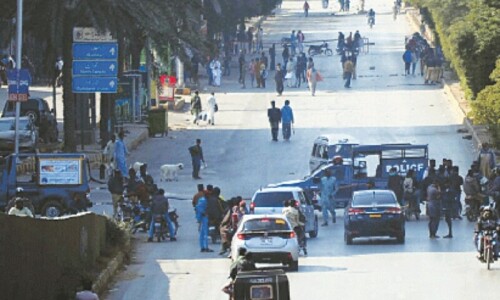HYDERABAD: Speakers at a seminar on Wednesday called for protection of ecology and livelihood resources in Indus delta and stressed the need for launching a social movement to pressurise the government to declare the Indus as a human being with all fundamental human rights and protect her health.
They said that Indus delta was dying gradually and all individuals would have to raise voice against this ‘violence’ to protect the world’s rivers and deltas.
They were speaking at the ‘Dialogue on restoration of Indus delta’ organised by the Pakistan Fisherfolk Forum (PFF) at Sindhi Language Authority on Wednesday. A large number of fishing and peasant community, civil society activists, legislators and educationists participated in the seminar.
The speakers demanded that at least 35 MAF (million acre-feet) freshwater per year should flow downstream Kotri Barrage for the protection of the delta and provision of adequate freshwater to natural lakes.
“The world is getting so serious about its rivers and granting them the same rights as those of human being. New Zealand has granted the Wanganui River and Indian state Uttarakhand has given Ganga and its tributary Yamuna the same legal rights as a human being,” said Zulfiqar Halepoto, water and environmental activist.
He stressed the need for launching a social movement to pressurise the government to declare Indus as human being with all fundamental human rights and protect her health.
He said that free flow of contaminated water from Peshawar to Karachi down to the delta needed integrated approach to rehabilitate flora and fauna in the deltaic region.
PFF chairman Mohammad Ali Shah said that the government had failed to formulate a policy for the conservation of the delta. This issue must be resolved internationally, he said.
“We will strongly oppose dams in government’s future projects. Deltaic environment is highly effected by the development of irrigation systems and dams on the river. Destruction of wetlands, deforestation, dumping of industrial waste into sea, construction of dams and corporate control on water resources are the issues which pose serious threat to life, health and livelihood of people.
“Everyone has a fundamental right to have sufficient and affordable water for drinking and domestic use, but unfortunately the communities who live around the river and delta face the worst water crises,” he said.
He said that at the coast, rising sea level was eroding delta plains. Sea level rise caused sea intrusion which increased the threat of flooding, submergence, warmer ocean temperature, salinisation of surface and groundwater. Morphological changes such as erosion and wetland loss and saltwater-soaked soils made agriculture difficult, he said.
In addition, rising atmospheric concentrations of carbon dioxide were causing oceans to absorb more gas and become more acidic, he said. The delta was tail of the river, where river met with the sea and controlled sea level. The ecology of the delta was threatened by natural and anthropogenic pressures, he said.
“The Indus delta [is] dying gradually, we must protect rivers and delta. The issues of rivers and deltas should be solved internationally. We should all together raise voice against this violence and protect world’s rivers and deltas,” he said.
University of Sindh Thatta campus pro-vice chancellor Dr Sarfaraz Solangi, civil society activists Suleman G. Abro, Mustafa Baloch, Dr Ismail Kumbhar of Sindh Agriculture University (SAU) and others also spoke.
The seminar passed a number of resolutions, demanding ban on construction of new dams or cuts on the Indus River, and urging political parties of Sindh to raise the issue not only on national level but also within an environmental and human rights perspective so as to win support of international stakeholders and UN bodies, it said.
A resolution called for a plan for the conservation of mangroves and environmental, social and economic development of the Indus delta. It said the government should pay compensation to deltaic people and conduct research on their losses.
Published in Dawn, August 3rd, 2017
















































Dear visitor, the comments section is undergoing an overhaul and will return soon.